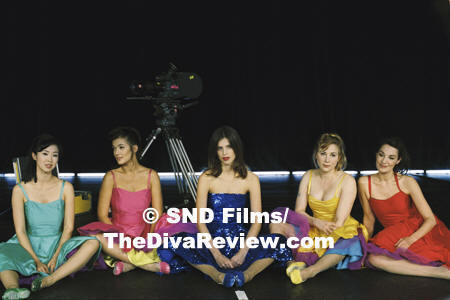
When Diva met Diva Plavalaguna...
We had a blast talking to the bold and outspoken Maïwenn Le Besco, star of The Fifth Element and Haute Tension. Maïwenn visited the Tribeca Film Festival to show off her mockmentary about the lives of some of France’s most famous stars. The delightful and insightful All About Actresses features fabulous musical numbers and is laced with cyanide wit. So, what do you really think about celebrity adoption, Maïwenn?
Voilà
All About Actresses – Maïwenn
 The
Lady Miz Diva: How did you go about structuring the film? Did the
stories come directly from the lives of the actresses you filmed, or
were these scenarios you wrote and placed the actresses in as you saw
fit?
The
Lady Miz Diva: How did you go about structuring the film? Did the
stories come directly from the lives of the actresses you filmed, or
were these scenarios you wrote and placed the actresses in as you saw
fit?
Maïwenn: Both. I came to them and I said, “I want to work with you. This is the subject of my next movie, it’s about actresses,” and depending on their reaction, I could feel how much they wanted to make fun of themselves. I could feel the sense of humour they had or did not have. With this direction, I was inspired or not inspired and then I started writing for all of them.
LMD: So, it’s all fiction. It’s not that Karin Viard really cannot speak English?
M: Well, she doesn’t speak English and she’s losing her power when she’s in front of someone {who does}. This is true. Of course, she doesn’t want to make a career in Hollywood, this is completely false.
 LMD:
You do catch the actresses in very unflattering moments. How did you
get them to be so open?
LMD:
You do catch the actresses in very unflattering moments. How did you
get them to be so open?
M: It’s not flattering, but if the actress is acting, it is flattering, because we have empathy for the actresses who wanted to play the worst part. For example, the actress Romane Bohringer? It was so difficult in Paris to find an actress to who was okay to act this part. They would always say, “I would love to, but I don’t want to play with my own name.” And I would say, “Can you imagine the whole movie with all the actresses playing with their own name except you? It’s gonna be ridiculous and you’re gonna be ridiculous.” But all of them, they were silly; let me tell you, they were so silly. I came to actresses who were really has-beens; Romane Bohringer is not really a has-been. She’s much more clever than the others that I’ve seen. And I said to myself, how come they don’t want to act this part, because what can they lose? Nothing, because they are has-beens, so they lost everything {Laughs}. Everything is in front of you to benefit and the movie gives hope to this actress because at the end of the movie, we can see that Romane Bohringer has a César, she is back, successful, and Mélanie Doutey, she’s the most successful in the movie, she’s at the part Romane was, selling champagne.
So, I was saying to the actresses, “Look, at the end, you are the star of the movie,” but they were so blocked.
LMD: How important is it that the audience is familiar with these actresses? Are you concerned that the US moviegoers will lose something by not knowing their lives or reputations?
M: I was thinking yes before the projection at Tribeca, but I was in the theatre, so I felt the public reaction, and I said to myself, ‘Oh Gosh, I’m sure they don’t know all the French actresses,’ and they got into the movie right away. They didn’t even care about who is who, who is famous. And the one who’s playing my husband, they don’t know him and in France, he is so famous. I said to the public, “Imagine I am married to Snoop Dogg.” That would be hilarious in front of the TV, “Hi Honey, I prepared dinner. Why are you so late?” That’s the only thing they missed of the comedy because they don’t know Joeystarr, but I told them afterward to imagine I was married to Snoop Dogg.
LMD: That actually brings up the interesting role-reversal in the film: You both have successful careers, yet you place the husband as the homemaker and you’re the mother running around getting the movie made and forgetting your son’s birthday.
M: But if a woman forgets the birthday of her son, it’s a big scandal. And then when it is the man missing the birthday, it’s no big deal.
 LMD:
How did your actors respond when you told them there would be singing
and dancing required in the musical sequences?
LMD:
How did your actors respond when you told them there would be singing
and dancing required in the musical sequences?
M: It was with the idea of the movie at the beginning, I said, “This is a false documentary, but the only dimension of the glamour of the cinema is with the musical scene.” So, when they said yes, they said yes to the whole thing.
Some of them didn’t like it, some of them told me, “I don’t wanna sing. I’m so afraid. I don’t wanna dance.” So, for these actresses, I told them okay, because if I gave a scene to all the actresses, it would be such a long movie.
 LMD:
I loved seeing Charlotte Rampling in the film, but I wondered what you
felt she represented in this piece about actresses?
LMD:
I loved seeing Charlotte Rampling in the film, but I wondered what you
felt she represented in this piece about actresses?
M: She represents the example that an actress past 50, she’s still working, she’s still beautiful and she has a different kind of mentality. I think she gives hope to actresses. And also, she doesn’t want to make the documentary, she says, “What’s the point? You’re going film me sleeping, reading, what’s the point?” I love in the movie when there is not only one way to think. I think we have to get all the points of view in the movie otherwise it is monolithic.
LMD: Had you scripted the dialog or did you allow your actors to improvise?
 M:
All the lines were scripted, but I asked all the actors not to learn
their lines. They had their reminders and then they were doing the
scenes as they remembered it. Because this is life. When I talk to you,
you don’t know what I’m gonna say. You don’t know what is gonna be your
reaction. I want to make movies like that. If you know that in two
minutes I’m going to say, “Oh, in my movie, I’ve done … da-da-da.” You
anticipate my reaction. And also, I think that an actor that has to
learn his lines, I think he’s losing 50% of his energy with the
memorisation and I want to have 100% of the energy of being here with me
on the set. An actor who is memorising, I can feel in his eyes he’s
telling himself, “What am I gonna say? What am I gonna do in a few
seconds when she tells me that?” So, I feel in the camera that he
doesn’t listen to his partner. In improvisation, they are listening so
much because they need to know what the partner is gonna say to react
themselves.
M:
All the lines were scripted, but I asked all the actors not to learn
their lines. They had their reminders and then they were doing the
scenes as they remembered it. Because this is life. When I talk to you,
you don’t know what I’m gonna say. You don’t know what is gonna be your
reaction. I want to make movies like that. If you know that in two
minutes I’m going to say, “Oh, in my movie, I’ve done … da-da-da.” You
anticipate my reaction. And also, I think that an actor that has to
learn his lines, I think he’s losing 50% of his energy with the
memorisation and I want to have 100% of the energy of being here with me
on the set. An actor who is memorising, I can feel in his eyes he’s
telling himself, “What am I gonna say? What am I gonna do in a few
seconds when she tells me that?” So, I feel in the camera that he
doesn’t listen to his partner. In improvisation, they are listening so
much because they need to know what the partner is gonna say to react
themselves.
LMD: Some of the comedy is surprisingly sharp. There is a scene where the popular young actress goes off to India to find herself and comes back with a child. Was this a comment on the trend of celebrities adopting children from poor countries?
M: It’s a mix with a French actress, who I won’t name, that used to say, “I’m fed up with work, I need to travel with my backpack. I need to sleep on the floor in a family’s house. I don’t want any money.” Then I saw her on the cover of Voici, a French gossip magazine, and she was in a hotel with an orange juice in Chile, or whatever, and the waiter was giving the orange juice like that *bows 90°* like a slave. So, that made me laugh so much.
Also, it was mixed with Angelina Jolie, she has a new child every three months, which I think is so ridiculous, and it shows how much she’s neurotic and pathetic. How come we give the child to her? If she wants to give birth with her body, that’s her business, but how come the governments give her so many children?
LMD: Are you at all afraid of backlash from things you say or show in your films?
M: No I’m not afraid of that, I’m used to it. With my first movie {2006’s Pardonnez-moi} there was such big scandal, so I’m used to disturbing people. I’m used to disturbing people who think politically correct. I think that’s the job of an artist is to disturb minds; to break, to change the mentality.

LMD: What’s next for you?
M: I want to make a film about police; to show another kind of policeman. I saw a documentary in Paris that made me cry, we could see a policeman that was so touched by his job. He was taking care of minors. I noticed that most of the time when you see a movie about police, they all talk about drugs and criminality, and there is no movie about police taking care of minors, protecting children. I started writing it.
LMD: What does it mean for you to show this film at the Tribeca Film Festival?
M: I was so scared of the reaction because my humour is very French. I thought my humour was very Parisian. At the first second of the movie, I felt, ‘Ooh-ooh-ooh, something is going on.’ They really liked my sense of humour. Then with the Q&A I had after the projection, I was so comfortable with the public. I was the same as with the public in Paris. I’m always making jokes. I always pretend I’m so pretentious {Laughs}. It’s one of my best souvenirs.
~ The Lady Miz Diva
May 1st, 2009
Interview conducted at the DirectTV Tribeca Film Festival Press Center
© 2006-2022 The Diva Review.com
|
|